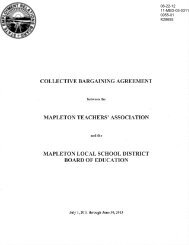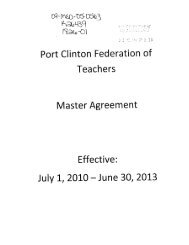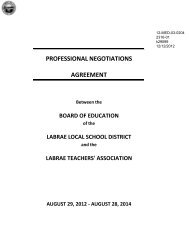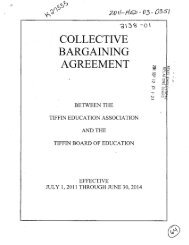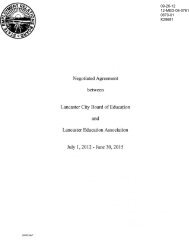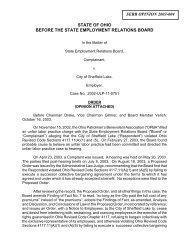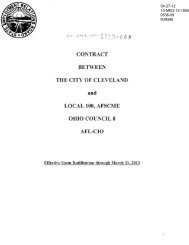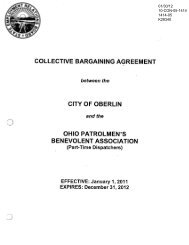FACT FINDING REPORT - State Employment Relations Board ...
FACT FINDING REPORT - State Employment Relations Board ...
FACT FINDING REPORT - State Employment Relations Board ...
Create successful ePaper yourself
Turn your PDF publications into a flip-book with our unique Google optimized e-Paper software.
4<br />
terms of the prospective agreement should be similar to the terms of the rejected tentative<br />
agreement.<br />
Contract rejection is a fact of life in industrial relations. However, depending on<br />
the underlying reasons for the rejection, it can cause problems for the parties when they<br />
try to finalize a new contract. Assuming that there was no bad faith or strategic behavior<br />
during the negotiations that led up to the rejected agreement, there is no reason to expect<br />
that subsequent negotiations will lead to a markedly different result. That is, the<br />
underlying reality of collective bargaining is that each side negotiates in a way that will<br />
maximize their gain. At certain times, either the Union or the Employer will have more<br />
bargaining power and negotiate a contract that is beneficial to its principals, i.e., it wins<br />
the negotiation. However, the underlying reality of negotiations is that each side does as<br />
well as it can to advance its goals given the external environment which determines<br />
relative bargaining power.<br />
If the parties have bargained properly, then each side has compromised on its<br />
positions in the attempt to find a workable agreement. However, if one side or the other<br />
rejects the tentative agreement, that rejection forces the parties to return to negotiations.<br />
If the parties bargained fully and fairly, there is little reason to expect that any new<br />
agreement will be significantly different than the rejected agreement.<br />
There is also a practical problem involved with contract rejection. If an Employer<br />
returns to the table and makes significant changes (concessions) to a tentative agreement,<br />
that “teaches” the Union that it can getter better contract terms by rejecting tentative<br />
agreements. This “trains” the Union to reject tentative agreements, and this makes the<br />
bargaining process more costly and less efficient. Therefore, the only time that a contract



